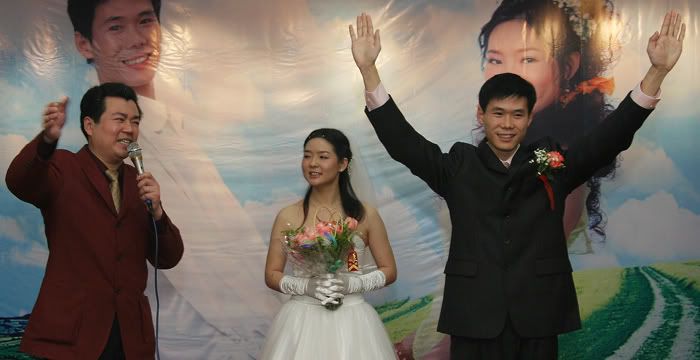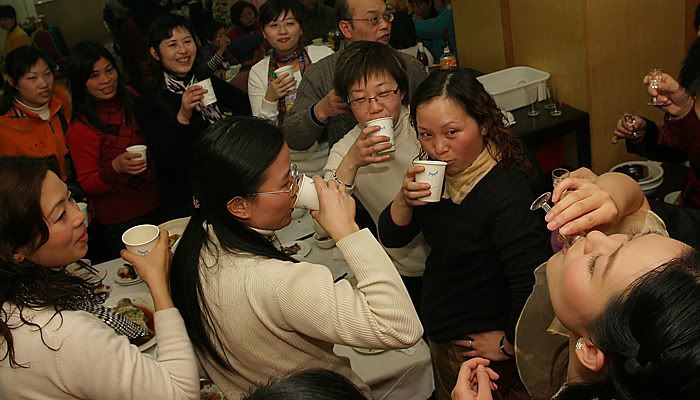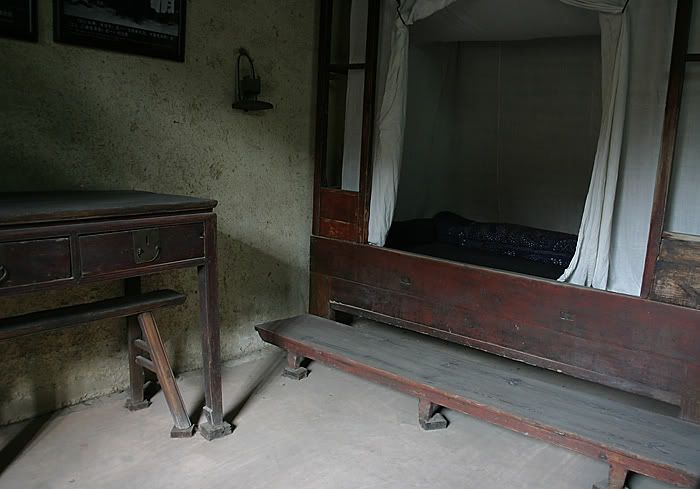Old and new
The first "modern" wedding I went to in China was interesting. This was the second one they had in the bride's hometown, Changsha.
For the most part, it was similar to the reception phase of an American wedding, since they don't do religion here, the "ceremony" took place in the same area as the dinner. It first started with a meet and greet of guests arriving in the lobby of the hotel. After they took their seats, her father gave her away and the groom carried her up to the podium.
They had a little problem-which I was told happens frequently due to people saying they can't come then showing up w/o notice-the restaurant didn't have enough tables and chairs. I knew the students of the bride would be the one's getting the shaft, what surprised me was the amount of "face" the family was saving by having the parents and immediate family of the couple sitting out in the lobby waiting for those who just came for food to leave. There wasn't a guest of honor table like we have in the States.
Instead of a justice of the peace or minister, they had an MC who did introductions and talk a little. Apparently, tradition is the MC makes it a little dirty and embarrassing, saying things like the bride having sex with the groom's father and things like that (see reaction pic below).
I-being the only whitey there-was naturally called up to give my view of the differences between a Western and Chinese wedding. The little Chinese I did say, wishing the couple long life, happiness, and kids just absolutely blew the crowd away, and made my Chinese instructor, who was the bride, very happy.
After that, it was rounds of toasts with bai jiu and food, the "youth" afterward went to a karaoke room to extend the fun. They started at one and ended at six.


The next day I was able to take a day trip out to Shaoshan, the hometown of Chairman Mao. It was a great experience after reading about him to actually see the context in which he lived and grew up, giving a fuller picture of the man and his rationale for...for well what he did at least in the first part of his influence.
The area doesn't seemed to have changed much, the only paved road was the one going to the sacred mountain,where legend has it his mom-after loosing two previous childs at birth or soon thereafter-made a pilgrimage (now you can use a ski lift) to give an offering for her next one to be healthy. There were a lot of rice paddies with simple irrigation, racks of meat drying outside in dusty development, folks killing time in front of residences watching tourists in buses go by.
What surprised me the most was his living conditions. Considering this in the context of early 20th century China, he was extremely wealthy. The family supported themselves by brewing wine and selling livestock. The house had about ten rooms, his not too shabby with a desk and covered bed (pic below, which I got illegally, no pictures, but the good ol' *cough* while pressing the bottom shutter on the camera and leaning over to look at an explanation to hide the camera from the Army Officer worked).
Coming from a wealthy family gave him the leisure time to lounge around and discuss revolutionary ideas with comrades, while living in an area with abject poverty balanced his mind and gave him a love for the farmers, which was and still is the real force for change in this country. It also gave him the funds to eat the awesome hong shao rou which I locally tasted *drool*.
I just wish that the tourists who could afford to come here, and the government who built up the immediate area like a shrine for a God, could see what Mao saw as he looked around at the support base for the soon-to-be most powerful country in the world.

For the most part, it was similar to the reception phase of an American wedding, since they don't do religion here, the "ceremony" took place in the same area as the dinner. It first started with a meet and greet of guests arriving in the lobby of the hotel. After they took their seats, her father gave her away and the groom carried her up to the podium.
They had a little problem-which I was told happens frequently due to people saying they can't come then showing up w/o notice-the restaurant didn't have enough tables and chairs. I knew the students of the bride would be the one's getting the shaft, what surprised me was the amount of "face" the family was saving by having the parents and immediate family of the couple sitting out in the lobby waiting for those who just came for food to leave. There wasn't a guest of honor table like we have in the States.
Instead of a justice of the peace or minister, they had an MC who did introductions and talk a little. Apparently, tradition is the MC makes it a little dirty and embarrassing, saying things like the bride having sex with the groom's father and things like that (see reaction pic below).
I-being the only whitey there-was naturally called up to give my view of the differences between a Western and Chinese wedding. The little Chinese I did say, wishing the couple long life, happiness, and kids just absolutely blew the crowd away, and made my Chinese instructor, who was the bride, very happy.
After that, it was rounds of toasts with bai jiu and food, the "youth" afterward went to a karaoke room to extend the fun. They started at one and ended at six.


The next day I was able to take a day trip out to Shaoshan, the hometown of Chairman Mao. It was a great experience after reading about him to actually see the context in which he lived and grew up, giving a fuller picture of the man and his rationale for...for well what he did at least in the first part of his influence.
The area doesn't seemed to have changed much, the only paved road was the one going to the sacred mountain,where legend has it his mom-after loosing two previous childs at birth or soon thereafter-made a pilgrimage (now you can use a ski lift) to give an offering for her next one to be healthy. There were a lot of rice paddies with simple irrigation, racks of meat drying outside in dusty development, folks killing time in front of residences watching tourists in buses go by.
What surprised me the most was his living conditions. Considering this in the context of early 20th century China, he was extremely wealthy. The family supported themselves by brewing wine and selling livestock. The house had about ten rooms, his not too shabby with a desk and covered bed (pic below, which I got illegally, no pictures, but the good ol' *cough* while pressing the bottom shutter on the camera and leaning over to look at an explanation to hide the camera from the Army Officer worked).
Coming from a wealthy family gave him the leisure time to lounge around and discuss revolutionary ideas with comrades, while living in an area with abject poverty balanced his mind and gave him a love for the farmers, which was and still is the real force for change in this country. It also gave him the funds to eat the awesome hong shao rou which I locally tasted *drool*.
I just wish that the tourists who could afford to come here, and the government who built up the immediate area like a shrine for a God, could see what Mao saw as he looked around at the support base for the soon-to-be most powerful country in the world.
